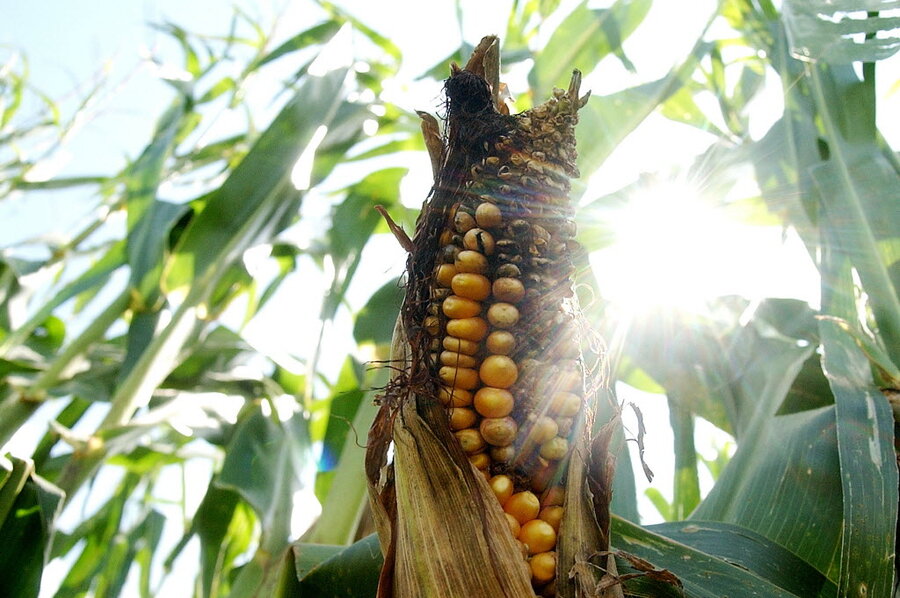Do biofuels harm the planet more than gasoline?
Corn ethanol and biodiesel biofuels may be more environmentally damaging than petroleum gasoline, according to a new study from the University of Michigan Energy Institute (UMEI),
The surprising finding comes after the research team, led by UMEI researcher John DeCicco, analyzed the amount of carbon dioxide (CO2) absorbed as the crops grow and then released when they are burned as biofuel. They calculated that the aggregate US crop yield can remove only 37 percent of the CO2 that burning biofuel releases into the air.
“What we found is that when you actually look at how quickly crops like corn and soybeans pull CO2 from the air and compare that with the emissions that occur when the biofuels like ethanol and biodiesel are burned, you find out that they are not carbon neutral like everyone has been assuming,” Dr. DeCicco tells The Christian Science Monitor.
That's a flawed premise, argues Daniel Schrag, a geology professor at Harvard who advises the EPA on bioenergy climate impacts. He says that biofuels don't have to be carbon neutral to be an environmentally preferable alternative to petroleum gasoline.
“For about 10 years there have been very careful studies of corn ethanol and all of the fossil carbon that is used to make it ... and those studies have gotten a range of answers, but it is about a 20 percent reduction of net emissions relative to gasoline,” says Professor Schrag in an interview with the Monitor. “Nobody ever thought corn ethanol was carbon neutral, because there are lots and lots of fossil inputs to it.”
The biofuel debate has raged for years, with critics worried about the impact of the additional land deforested to convert to corn fields, and proponents arguing for biofuel as a green alternative to gasoline. Another group says that it is really too soon to tell.
The conversation has generally been dictated by the food vs. fuel debate. This focuses on the indirect consequences of biofuel crop production, such as land use and deforestation, which create a ripple effect felt by the entire global food market.
DeCicco decided to question the basic life cycle analysis model that previous studies relied on, some of which had assumed that biofuel is carbon neutral and that only production-related greenhouse gas emissions need to be taken into account when comparing biofuel to fossil fuels.
Whether you burn biofuel ethanol or petroleum gasoline, he argues, the same amount of CO2 is released into the atmosphere. So comparing the fuels' environmental impacts comes down to how efficiently that carbon can be removed from the air, he says – and forests are better at that than cornfields.
"The United States uses 40 percent of its corn harvest to make ethanol, but that does not mean mean we eat 40 percent less corn-based products," DeCicco tells the Monitor.
DeCicco explains that as cropland once used for food is transferred to fuel use, food must be produced elsewhere, meaning that more grasslands and forests are converted to production. However, grasslands and forests can neutralize more carbon dioxide than crops, he says.
Schrag says that this ignores the long-term perspective, when biofuels make up for carbon loss from forests.
“In their approach time scale does not come into it,” he tells the Monitor. “They are looking at crop yield data and assuming that you should balance the carbon cycle based on how much crops you produce.”
Michael Wang, a researcher at the Argonne National Laboratory, tells the Monitor that he also questions the study's carbon accounting, arguing that the study does not properly account for the carbon uptake or that corn production for both ethanol and for food increased over the period of the study.
“The carbon uptake by the US farming systems is calculated based only on grain harvest," Dr. Wang tells the Monitor. "Carbon uptake embedded in above- and below-ground biomass is ignored in the paper with a simple assumption that carbon in these biomass sources are oxidized back to the air."
Additionally, the research received funding from the American Petroleum Institute, which critics say is grounds for skepticism, but the UMEI researchers stated that “the analysis, results and conclusions presented [in their study] are those of the authors alone.”
Other experts have come out in support of the research. Tim Searchinger, a researcher at the Science, Technology, and Environmental Policy Program at Princeton University, said that the research was very narrow, but useful.
“This article is saying that if you think the reason biofuels are helping to solve climate change is because the US is increasing its production of crops and that increased production of crops offsets the carbon release from burning the biofuels, you’re wrong. That is not what is happening,” Mr. Searchinger tells the Monitor. “What reduces carbon in the atmosphere is not the biofuel, it is the plant growth.”
DeCicco says that the solution is not to make biofuel more efficient, but to invest in reforestation.
“We should not be trying to make biofuels at all, any time soon,” DeCicco tells the Monitor. “It is much better to reforest and restore ecosystems.... Reforestation is a much better way to remove CO2 than anything we can do with biofuels.”






